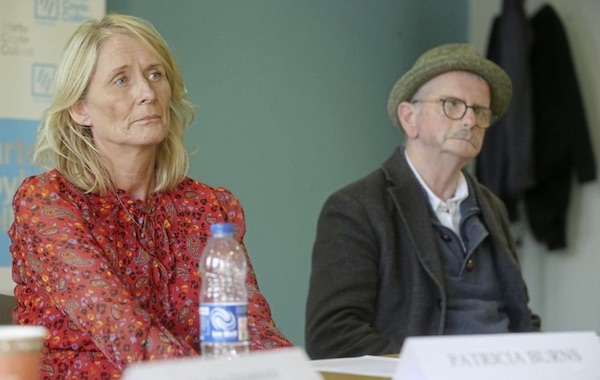
The families of two victims of killer British soldiers are to make a last-ditch plea against the plans for an overarching amnesty.
A controversial pardon is still being planned by the London government to ensure that former British soldiers will no longer even be questioned on offences they carried out in the north of Ireland.
The plans will see an end to all prosecutions, legacy inquests and civil actions related to the conflict or force them to be scrapped.
A Bill to bring the proposals before the Westminster Parliament in London is expected to be introduced at the start of next month. British Prime Minister has said he hopes it will ‘draw a line’ under the conflict.
Patricia Burns (left), the daughter of Thomas Burns who was shot by the British Army in north Belfast in 1972, and Daniel McCready, whose brother Jim McCann was one of the New Lodge Six shot dead in north Belfast in 1973, have now lodged a judicial review challenge in the High Court.
Ms Burns was just six when her father was killed outside Glen Park Social Club in July 1972.
“In my opinion the government is trying to put through the legacy proposals as quickly as possible,” she said. “Once that happens it’ll be too late for us.”
Almost 50 years later she is still fighting to get the facts around the case. A request for a new inquest was rejected and the original inquest papers were heavily censored in an evident cover-up.
On the planned new laws she said she had to fight to “be the voice of my father” as he was not here to fight for justice.
“It’s just another kick in the teeth. My whole life everything we have pushed for the door has been shut. There’s never been anything easy. I mean we haven’t done anything wrong and we are the ones that have to keep pushing, pushing, pushing to clear daddy’s name,” she said.
Mr McCready (right) said he has been battling for justice since he was 16. “The night our Jimmy was shot dead, the whole family just broke up,” he said. He was shot dead in a drive-by shooting by the loyalist UDA acting in apparent collusion with the British Army.
The judicial review is an unusual legal move, said lawyer Patricia Coyle, as there is no legislation yet to review.
They are asking the judge to hand down an “advisory judgment” on the “constitutionality and lawfulness of the proposals in domestic and international law”, she said.
They will also seek an advisory declaration that any legislation that seeks to terminate civil claims, inquest applications or any other court proceedings would be a “fundamental unconstitutional interference in the role and function of the judiciary” as well as a breach of European convention of human rights.
![[Irish Republican News]](https://republican-news.org/graphics/title_gifs/rn.gif)
![[Irish Republican News]](https://republican-news.org/graphics/title_gifs/harp.gif)

